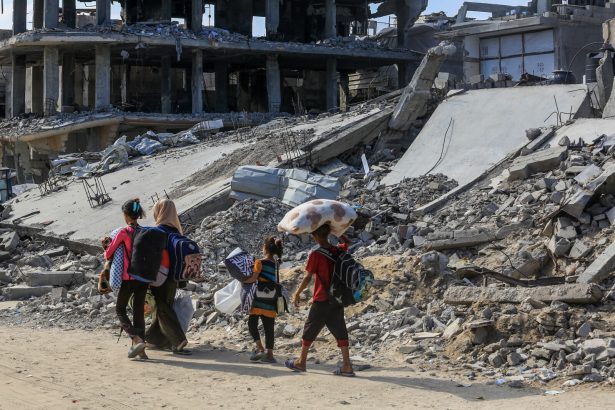In April 2024 Fathom published an interview with Mitchell Cohen entitled ‘From Stalin to Hamas: The Return of the Left that doesn’t Learn.’ This was followed by further questions in The Austrian journal Zwischenwelten (Intermediate Worlds) about a one state solution and the distinction between left antisemitism and sharp criticism of Israeli policy in a piece that can be found in English here. The following article – which relates to the war between Israel and Hamas in Gaza, first appeared as a follow up to the translation of these interviews in a special issue of the journal Pasajes (University of Valencia, Spain). Cohen was the co-editor of the democratic left journal Dissent from 1991 to 2009 and is professor emeritus of political science at Bernard Baruch College of the City University of New York. His books include Zion and State: Nation, Class, and the Shaping of Modern Israel and The Politics of Opera.
Since Hamas broke an existing cease-fire on October 7, 2023, murdering 1200 Israelis, taking 250 hostages, and triggering a terrible war, the Gaza Health Ministry, an arm of Hamas, estimates some 50,000 Palestinians were killed. This number misleads, since it doesn’t distinguish innocents from fighters. The latter, says Israel, which has its own credibility problems, counts 20,000. Still, combatants in war are legitimate targets. That leaves “collateral damage” of tens of thousands. Some judgments about this conflict and these numbers are made in “the fog of war” — but also in a moral miasma of propaganda wars and calculations, thickened by our era’s communications revolutions.
Here is a contention made in spring 2024 by Hamas leader Yahya Sinwar, October 7’s architect, to colleagues negotiating a possible ceasefire: “We have the Israelis right where we want them.”
Where? In a grating war provoking international censure of Israel’s fierce response to Hamas’s actions. When Sinwar expressed his satisfaction, the number of Palestinians — innocents and fighters – allegedly killed was 37,000. His corpse soon joined theirs’s, but for him, as for Hamas, distinctions between military and noncombatant casualties blur. Palestinian civilians died, he said, as “necessary sacrifices.” So, it would seem, they too ended up right where his strategy needed them, although this is usually bracketed by those decrying “Israeli genocide.”
Israel’s image has suffered greatly. A contributing factor, however, has been obtuse long-term policies towards Gaza and the West Bank under Netanyahu and rightwing governments. They undermined Jerusalem’s credibility long before October 7, and his lack of credibility intensified because of evasiveness in proposing where the Gaza war should go, in linking means to ends. Now, even Trump mistrusts Israel’s premier. Yet many of today’s critics were feverishly hostile to Israel long before this war, hissing at “Zionists” much as American neoconservatives jeered at “leftists.” Their indictments never factored in the implications of the entrenchment by Hamas of its fighters within a civilian population — under schools, mosques, and hospitals (especially its tunnel networks). Or the theft and hoarding of a billion dollars of humanitarian aid by Hamas to fortify its warriors and underground at the expense of civilians in misery.
“Collateral damage” became “resistance,” when originating in Hamas’s military and propaganda strategy; it became “genocide” when Israel targeted Hamas’s military.
There are many troubling aspects to this mind set. What is the distance between Jean-Luc Mélenchon’s repetition of the medieval accusation of deicide on French TV in July 2020 – he said that Jesus was “apparently put” on the cross “by his own compatriots,” Jews that is — and his party, La France Insoumise, denouncing Israeli “genocide” as a mobilizing tool in the 2024 elections? What is to be said of the “Columbia University Apartheid Divestment” movement, which announced for October 7’s anniversary that: “We are Westerners fighting for the total eradication of Western civilization.”
Civilians inevitably die in wars, making “proportionality” a necessary debate (unless you are a pacifist or think killing Israelis is by definition “liberation”). Targeting noncombatants is never legitimate. But moral exigencies get complicated if pursuit of legitimate targets in a justifiable war gets civilians killed.
“Proportionality” cannot be abstracted from a context or it slips into mechanical quantification — a bloodless adding-and-subtracting, in which a “one for one” standard imposes on complex, painful human realities. Its basis, instead, must start from the importance of a military target relative to the number of possible victims. Here’s an example debated by theorists of justice in warfare. Nazi Germany is constructing factories in densely populated civilian areas to make V-2 rockets to hit London. Is the Royal Air Force right to bomb them? What if a factory makes only one rocket in six months? It would seem hard to justify high “collateral damage.” But thirty a week? When all past German behavior and war goals make the intended use obvious? It seems to me that destroying the factories is then justified. That doesn’t lessen the tragedy of those killed. It makes the German strategists the culprits.
Does this differ appreciably from targeting Hamas’s war complex and vast underground system? Not so long as germane (but never quite adequate) provisos are applicable as elsewhere. For examples: there must be no plausible alternatives; targets must be of important military consequence; actions cannot be for revenge’s sake. If it is shown – and not by people who condemn Israel in all circumstances — that such reckonings were disregarded in Gaza, then there may be war crimes. Otherwise, Hamas, which celebrates openly civilian “martyrdom,” bears moral onus for using non-combatants as its shield. To say: “never mind their ideology, just don’t bomb, too many die” – and too many have died – is evasion minus a convincing counter-strategy. It amounts, in effect, to: let Hamas have what it wants because civilians are dying.
Without a serious alternative, reproach becomes moralising advocacy of “the cause of Palestine,” perhaps useful for domestic political constellations in, say, European countries, but with utter disregard of living Palestinians. They need Israeli interlocutors thirsty for real change in Palestinian-Israeli realities, like the recently created Democrat Party led by Yair Golan and the organizers of recent demonstrations over the past two years, against the current government. Recognising “the state of Palestine” is a gesture as bankrupt as declaring that Gaza will be a Riviera. Those making it might as well fund Netanyahu’s next re-election campaign.
I do not oppose a Palestinian state, but we must be morally frank enough to see that a two-state solution has no immediate prospect, thanks particularly to October 7. Israelis will not be persuaded to take steps that might bring tunnels to the West Bank. Palestinian demands are illusions if apart from negotiations with Israelis. October 7 and the Gaza war were “famous victories” for foes of a two state-solution — Hamas and Israel’s rightists. Israel needs a political sea-change: Netanyahu has a parliamentary majority even through 60% already oppose his government and obtuse priorities. Yet, there is no “get rich quick” way to peace. Linked measures should be taken to make bloodshed increasingly difficult. Most immediately, Gaza’s reconstruction must come with demilitarisation. That assumes it will not be occupied, not by Israel in the future, not by Hamas as in the past.


































